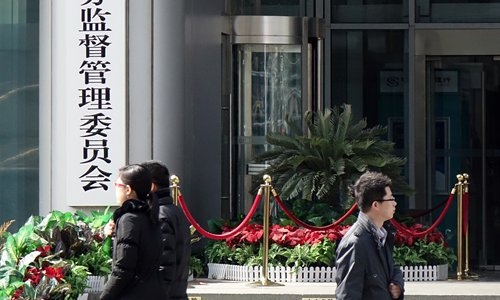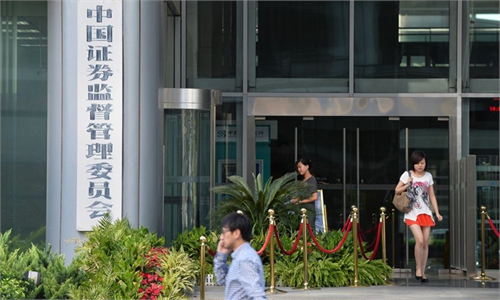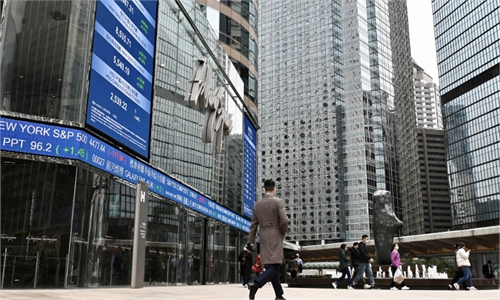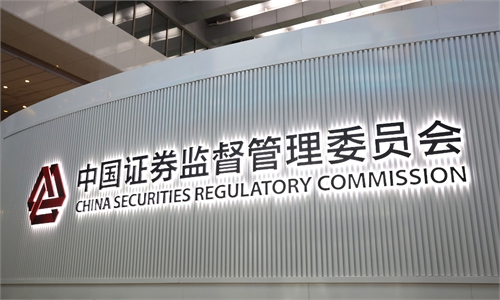China to expand registration-based IPO system across A-share market with eye on lifting direct financing ratio
Move aims to boost ratio of direct financing, aiding real economy

People walk outside the headquarters of the China Securities Regulatory Commission in Beijing. File photo: VCG
Chinese regulators announced plans to expand the registration-based IPO system across the A-share market on Wednesday, in an effort to expand the capital market and ratchet up the ratio of direct financing to meet the needs of economic development.
The China Securities Regulatory Commission (CSRC) said that it is soliciting public opinions on draft rules and regulations regarding expanding the registration-based IPO system to all of the nation's bourses.
The announcement followed a visit to the People's Bank of China, the central bank, and the State Administration of Foreign Exchange by Chinese Premier Li Keqiang, during which Li stressed enhancing the role of finance in stabilizing the macro-economy and improving financial services to keep the economy performing within a reasonable range.
The process has been years in the making and Chinese securities regulators have repeatedly vowed to push forward the reform at an appropriate time. It was even included in the Government Work Report in 2022.
China began its reform of the registration-based IPO system, a shift away from the approval-based system, by the introduction of the STAR board in Shanghai in 2019.
On Wednesday, the CSRC said that the time is ripe to extend the system across the board.
The Shanghai, Shenzhen and Beijing exchanges have all conducted trials of the registration-based IPO system with some having a history of as long as four years. These programs have had a marked effect of lifting the support of the capital market for the real economy, especially companies in the science and innovation sectors, the regulator said.
Chinese financial and securities experts said that the eventual adoption of the system across the A-share market will significantly improve the ratio of direct financing in China, thereby aiding the development of the real economy.
The process will meet the demands of China's economic transformation and increase support for the real economy from the capital market. It also shows that China's general IPO and stock listing system is becoming mature, Yang Delong, chief economist at Shenzhen-based First Seafront Fund Management Co, told the Global Times on Wednesday.
Relevant laws and regulations must be formulated, such as a class action system targeting illicit acts, such as fraud and the dissemination of false information. The Criminal Law may also be applied to deter any offenders, said Yang.
A director surnamed Huang at a Chinese securities firm said that listings on different exchanges will follow a unified set of rules and requirements, which will offer more institutional fairness to market participants, especially companies seeking IPOs.
Huang said this will be a milestone in the development of the A-share market.
"The proportion of direct financing will obviously grow when the new system starts, but the exact increase will depend on the number of IPOs and the size of enterprises," Xi Junyang, a professor at the Shanghai University of Finance and Economics, told the Global Times on Wednesday.
Xi said that the new system might formally start in mid-2023, and the responsibility for controlling IPOs will shift from official authorities to multiple stock exchanges.
"However, exchanges should control the pace and number of IPOs... to avoid liquidity problems from too many or too large IPOs in a short time," said Xi.
Dong Shaopeng, a senior research fellow at the Chongyang Institute for Financial Studies at Renmin University of China, predicted the official commencement of the new system will be around June.
China's ratio of direct financing, especially equity financing, is believed to be too low. Public data dating back to September 2020 show that China's ratio of direct financing is about 29 percent. In contrast, that of the US is well above 50 percent.
The move comes as China seeks to provide support to the real economy in the post-pandemic era.
With a rebound in economic growth underway, the Chinese stock markets had one of its best months in January.
The flagship Shanghai Composite Index edged down 0.42 percent on Tuesday, finishing the month up 5.39 percent. The Shenzhen Component Index gained 8.94 percent for January while the tech-heavy ChiNext index rallied 9.97 percent.
In January, a shortened trading month factoring in the weeklong Spring Festival holidays, overseas investors increased holdings of Chinese mainland shares by 141.2 billion yuan ($20.94 billion), a monthly record.




